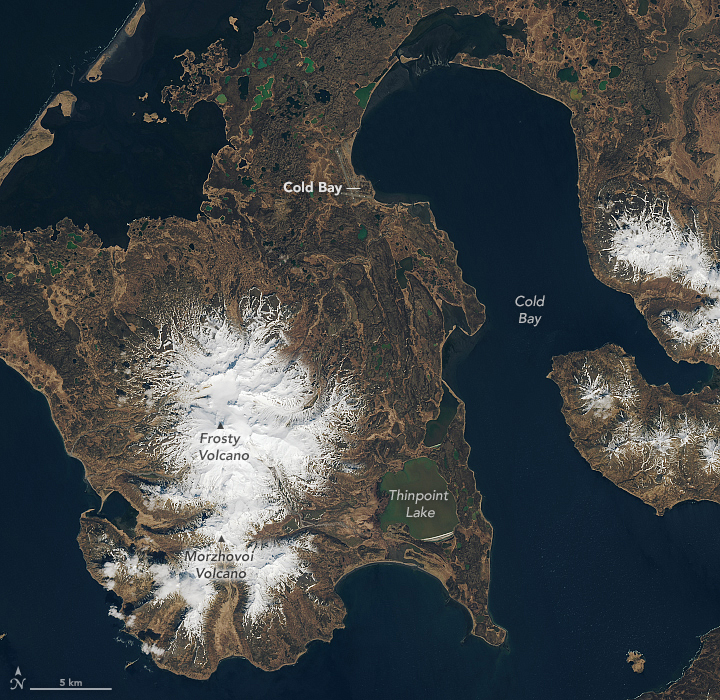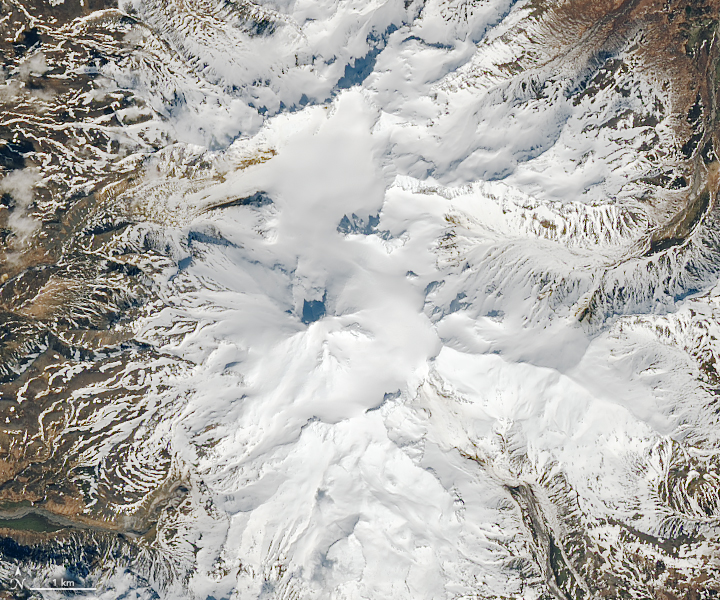
Frosty the Volcano
Downloads
- frostypeak_oli2_2023112_lrg.jpg (4852x4043, JPEG)
- frostypeakzm_oli2_2023112.jpg (720x600, JPEG)
Metadata
- Sensor(s):
- Landsat 9 - OLI-2
- Data Date: April 22, 2023
- Visualization Date: December 19, 2023
Frosty is a stratovolcano located in Alaska’s Aleutian Island chain. Although the volcano has been dormant for thousands of years, the rock below its glaciated peak tells a story of its lively past.
The image above, acquired by the OLI-2 (Operational Land Imager-2) on Landsat 9 on April 22, 2023, shows Frosty’s 5,670-foot (1,728-meter) peak and the nearby town of Cold Bay to the north.
Geologic surveys of the volcano indicate that Frosty’s summit caldera is made up of two coalescing craters. Volcanic activity likely began from a single central vent, and fissures on its flanks contributed to its growth. But during the later stages of its development, activity shifted to a new principal vent, creating its present day two-crater summit.

According to the U.S. Geological Survey, explosive activity occurred at intervals throughout the growth of Frosty’s main cone. But much of its eruptive activity was effusive, in which basaltic lava flowed from the vent.
To the south of Frosty is Morzhovoi, an extensively eroded stratovolcano with long u-shaped valleys extending from a central caldera. Only remnants of the volcano remain, with isolated peaks that are fragments of the original caldera rim.
Both volcanoes have been relatively quiet for thousands of years. In July and August 2001, the Alaskan Volcano Observatory received several reports of steam emanating from Frosty’s peak. After some investigation, the observatory determined that the volcano was still inactive. Mount Shishaldin, a livelier volcano on Unimak Island southwest of the Cold Bay Complex, has had at least 13 explosive events since July 2023.
References & Resources
- Alaska Volcano Observatory Frosty Peak description and information. Accessed December 22, 2023.
- McGimsey, R. et al. (2004) 2001 Volcanic Activity in Alaska and Kamchatka: Summary of Events and Response of the Alaska Volcano Observatory. Open-File Report 2004-1453.
- NASA Earth Observatory (2023, July 25) Shishaldin Erupts. Accessed December 22, 2023.
- Smithsonian Institution, Global Volcanism Program Frosty. Accessed December 22, 2023.
- Waldron, H. (1961) Geologic Reconnaissance of Frosty Peak Volcano and Vicinity, Alaska. (Geological Survey Bulletin No. 1028). US Government Printing Office. Accessed December 22, 2023.
NASA Earth Observatory images by Lauren Dauphin, using Landsat data from the U.S. Geological Survey. Story by Emily Cassidy.
This image record originally appeared on the Earth Observatory. Click here to view the full, original record.